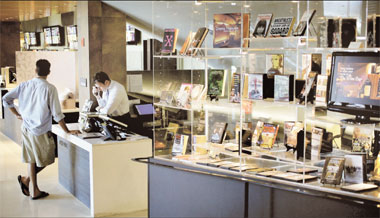 |
|
A selection of classic films DVD and books are offered for sale at The Landmark Movie Theatre in Los Angeles.
|
Today, young movie-watchers look increasingly like Molly O'Connor. A junior at the University of Dallas, Texas, she still goes to the cinema occasionally, but is often just as happy to hunker down on a bed or a couch with friends to watch a downloaded movie on a laptop that's perched on a nearby desk or a chair.
"Sometimes, it's nice to have a wider screen, but I don't think I gain that much by going to a movie theater anymore," the 20-year-old student says. "Now, it's more about convenience."
Or as 26-year-old Michael Brody puts it: "I watch movies the way many people listen to music - anytime, anywhere, any way."
A freelance writer in New York who blogs about film, he used to go to the movie theater every week. Now he's there once or twice a month, partly to save money and also because he doesn't think most movies are worth the effort.
Sounds like bad news for movie theaters. But we're talking about an industry that not only survived, but ended up thriving amid the arrival of television in the 1950s, videotapes in the 1980s, and DVDs in the 1990s.
The reason? An ability to continually remake themselves and find new ways to generate revenue, by introducing everything from the multiplex and more elaborate concessions to lengthy pre-show advertising.
Now they're doing it again.
Step into some of the more modern cinemas these days, and you'll see increasingly common enticements aimed at keeping the lucrative youth market, even as online video becomes more accessible on sites such as YouTube, Netflix or Hulu - or from movie pirates who steal and distribute movies illegally.
These upgraded theaters' offerings begin with the super-comfortable seating, even lounge chairs and bean bags in some auditoriums. Add 3D effects and larger-than-life IMAX blockbusters, made possible by new digital projectors. And then come the midnight movie premieres and opening-night parties.
To boost revenues and appeal, many theaters also are broadcasting live sporting events, operas and symphony performances and hosting in-theater video game competitions on the big screen. Still others are opening in-house restaurants and bars for those old enough to drink alcohol.
It is this century's answer to the movie palace of old - or the "Broadway-ification" of the movie-going experience, according to Charles Acland, professor of communications studies at Concordia University in Montreal.
"In a nutshell, what you're going to see is cinema-going aimed at people who go less frequently," says Acland, author of "Screen Traffic: Movies, Megaplexes and Global Culture."
"It might cost a bit more, he says. "But it will be much more of a special event. People will expect some sort of an experience that you can't get anywhere else," he says.